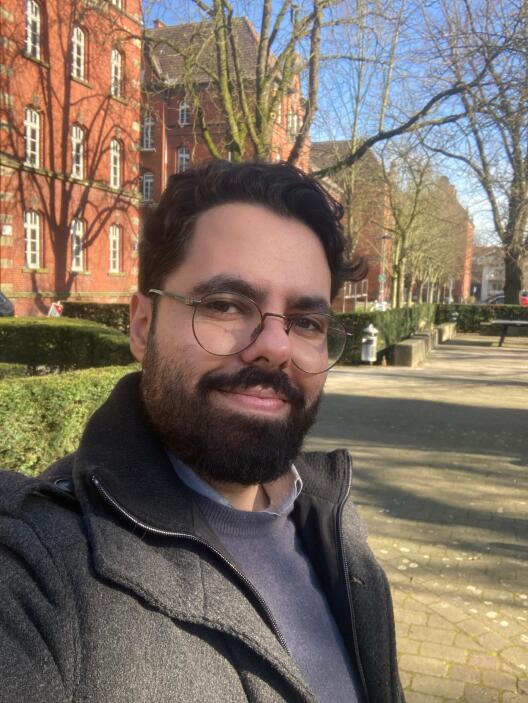
1. How did your stay at the University of Münster contribute to your professional development?
The impact wasn't a direct one, but one of the things I gained was a greater sense of responsibility by seeing a different perspective on the relationship between universities, because usually, we focus on our daily routine.
This time, as I was representing USP and you at the University of Münster, I felt that it’s not just our daily routine that matters. Our activities have a larger responsibility and a different perspective. My work has an impact on the relationship between two universities.
Eventually, this connection could lead to a better contribution between the two institutions and we have an impact beyond our daily tasks. I started to feel a greater sense of responsibility towards the activities. So much so that, as soon as I got back, we hosted a group from Portugal. I handled the situation differently because it’s not just me doing a task to welcome the people from Portugal. It has an impact and consequences much beyond that.
Professionally, I realised we need to be careful because the responsibility is much bigger than we think. We focus on the day-to-day, so it becomes routine, nothing special. But it’s a lot, we contribute greatly to the functioning of universities, for their continuity, for research growth, and to expand the university’s reach. So, it’s an impact bigger than I expected.
Without hiring new people, roles get quite mixed up. But at the University of Münster each department´s role and each person´s function are much clearer. That’s something we can bring into our daily routines. We can organise the flow better and get things more aligned. First, to understand the organisation better, and also, if improvements are needed, we can pinpoint them directly. It’s not about being tied to one person but separating roles.
This really helped—this experience with you! To know that we can organise things better here.
I took your work, and Anja’s, as an inspiration for me because you both have a deep understanding of the research your professors are involved in. You have that catalogue of professors interested in research in Brazil. I thought that was brilliant! Wow!
Because we help out too. There were people from ECA (School of Communication and Arts), for example, looking for help with a visit from a professor abroad. But we don't have direct contact, we don't know what the person's research is or who would be the best professor to host them. I thought it was fantastic that you have that.
I don’t know where you store that knowledge, but you know which professor works in which area, and there’s another professor in the same field! I was amazed. This connection with professors, this understanding of the academic side, and the expertise you have, as well as the database of professors interested in Brazil. I talked to the team here to see if we could set something up like that.
In fact, we just signed a project in my area because I work in the administration. The mobility team is now doing the USP Academy. So, we have a closer relationship, and now we have more contact with the professors who are interested. We’re offering courses to undergraduates and postgraduates, and we’ve hosted people from all over Latin America and professors from many places. It’s great to see this development.
The Welcome Centre was also fantastic because it’s something we don’t have here. We don’t have a centralised structure for receiving postgraduate students and researchers. We don’t even have a physical space like you. Those apartments and housing for researchers—we don’t have that. Working with them was really interesting because I had zero experience with this type of administration.
And I managed to see, by meeting with the team, that they work directly with other funding bodies, I remember there was direct contact with the people who managed the spaces where researchers stayed. They also assisted with documentation. It’s a whole experience.
We have a small prototype of a prototype, just a tiny one, where we only assist with documentation. We liaise with the federal police, but it’s to a much smaller extend.
So, the time I spent with the Welcome Centre team, participating in their meetings and observing the discussions about roles, was truly impressive! And from what I understood, it’s a central part of the process. They are responsible for welcoming postgraduates and researchers. It’s a service that makes a huge difference and has a very positive impact on the researchers visiting the University of Münster!
Here, we realise things are more fragmented—each department receives people in their own way.
So, it was a very interesting experience. The Brazil Centre part, with its focus on a specific country and on Brazilian universities as a strategic choice, was fascinating. Because there is a Brazil Centre dedicated to this.
We don’t have a similar structure here, a body solely focused on German universities, or on American universities. So seeing these structures working and being effective is really cool. It’s the kind of initiative that’s beyond my level, but just talking to the professors and those who can make changes is really exciting.
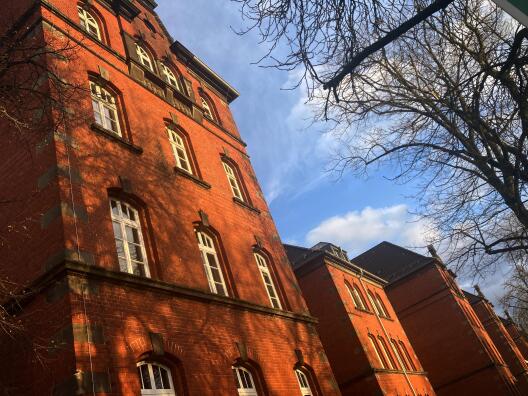
2. Did you face any difficulties in general during your experience there?
No, not really. I think maybe the first two weeks, since it was a pilot project, the difficulty was knowing what to do, what I could say, and what I couldn’t. What would the level of activity be? But then, we established that it would be for me to get to know the structure.
I saw a colleague who had a slightly different experience because he knew German, so they asked him to do some things in the office, like checking emails and following up on students’ requests step by step. Since I wasn´t proficient in the language, I was a bit detached from that closer reality. I think that was the main difficulty. Understanding what would happen. But once we started to get the hang of it, time ran out. We started scheduling meetings and meeting so many people, but then it was over—so fast!
So, I think it was more about getting to know things during those first 10-15 days. Once we established a routine, it was fine!
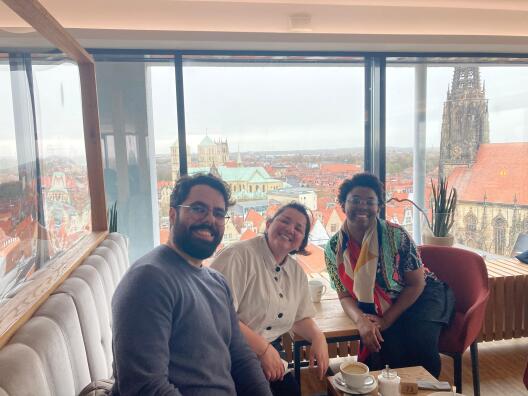
3. How did your stay at the University of Münster for the Staff Exchange affect you personally?
It was my first international professional experience lasting more than a month. Normally, I would go on holiday and approach it with a different mindset. This time, I went alone and in a professional capacity, so I was really anxious—I didn’t know if I’d manage. I wasn’t sure if it would be useful, and I was really scared. But I faced it, and I survived. So, personally, it left me satisfied. Because at the start, I was really nervous. When I arrived, I thought I’d freeze or starve. It was a rainy, cold night, and I arrived at 11pm. I thought, “Maybe I’ll go back next week, forget it!” But I took on the challenge, and you all made it much easier for me.
But that was an interesting part of the experience because it’s tough to arrive somewhere new, not knowing anyone, and having to adapt. Even though it was short, just two months, I realised I could handle it. It even made me more eager to pursue an academic career and go abroad—something I hadn’t considered before. Now, I want to study abroad.
It worked out, and I thought, “If I could handle this, I can handle much more!”
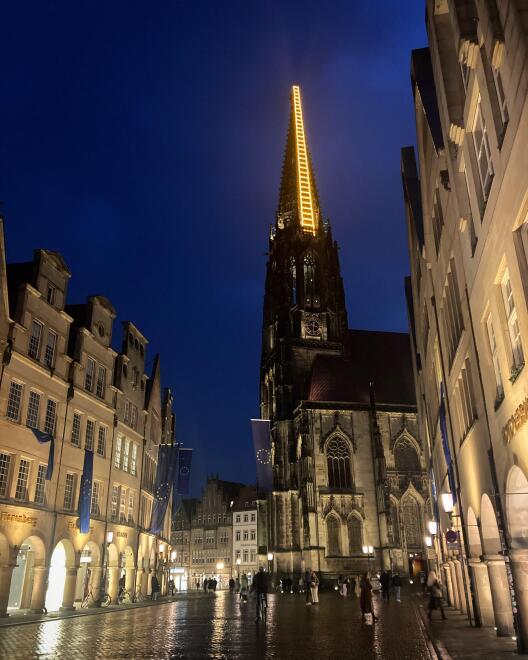
4. Would you recommend a Staff Exchange and why?
I would definitely recommend it! It was an enriching experience. As I said before, the people were very welcoming. Everyone at the University of Münster helped a lot. There wasn’t a place where I wasn’t well received. People took the time to meet with me. Both professionally and personally, it was a huge gain. I’d definitely recommend it—10 out of 10.
I’m aware that your team, you all, make the difference. I’m not sure if everyone has the same luck I did, to have such an experience. If someone asks about Münster, I’d say: Go! It’s wonderful.
Even though we weren’t sure what we were going to do at first, no one was unfriendly. Even the people from the law office talked to me, told me about the size of the team, and explained how things worked. They friendly explained everything and took the time. I got spoiled! [laughs]
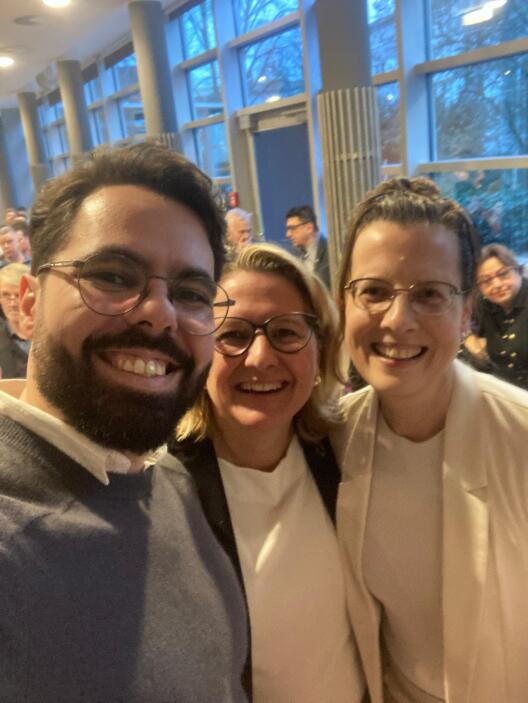
5. Found or lost in translation? Can you “translate” this experience into a word, phrase, or quote?
I think a phrase would be: “No matter the place, we’re all the same.” I don’t know how else to phrase it. I was very worried about the cultural shock regarding work and how people interact. As I realised that things are the same and we have the same problems it gave me peace of mind, something I even mentioned to the Welcome Centre team when I was leaving. I expected you all to be less hospitable and more distant, but everyone welcomed me warmly and was super helpful. You could see that people wanted to make a difference, to work and develop. They’re just like us.
So the phrase that stays with me is that, despite being from different places, we’re all the same. We’re all people, and the problems are the same too. It gave me peace of mind, realising that things are the same, the same problems.
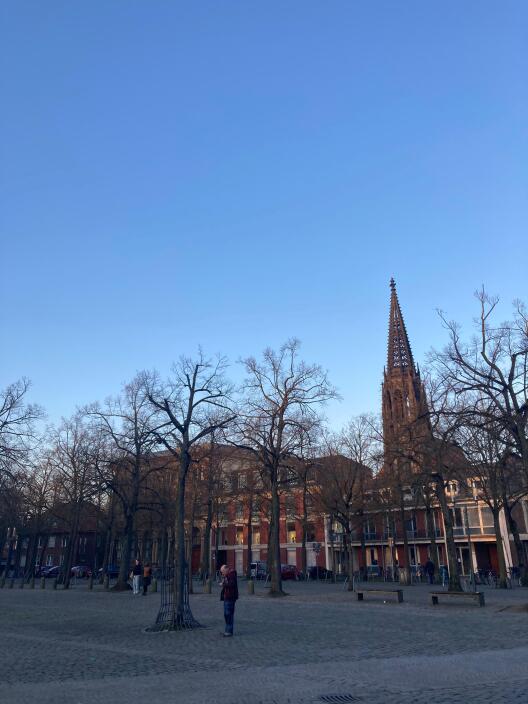
The Cafézinho Moment
Shall we go for our cafézinho moment? And what stories have you lived through that made an impact during the Staff Exchange? Let’s have a coffee while you tell me about them.
Well, I think I have a couple of stories!
I’m not sure if I told you, but I became a pet parent. Unintentionally!
One day, it was raining and quite cold in the evening. I have a cat back in Brazil. I was about to go to bed when I heard a distant meow. I thought it was me missing my cat, because it was so cold and it had rained heavily that night. I could hear this meowing in the distance.
The accommodation was shaped like a U, surrounding a square, and I thought, “No way!” I opened the door, and there were other people on the balcony looking for the cat too. There was indeed a cat around, it wasn’t just me! We were searching and asking if anyone knew whose cat it was, but no one knew. At that moment, the cat climbed up and ended up sitting by my apartment door. And because I also have a cat, my heart broke! It was cold and raining, and people were calling the cat to the other apartments, but it didn’t want to go. As soon as I opened my door, it walked right in.
I thought, “Oh my god! What am I going to do with this cat?” It stayed the night, and in the morning, I opened the door and it walked out. I put out some food and water for it, and that was that.
It came in, had a look around the room, and then slept. I didn’t have the heart to send it away, but it looked well cared for. I think when it started to rain, it just hid somewhere.
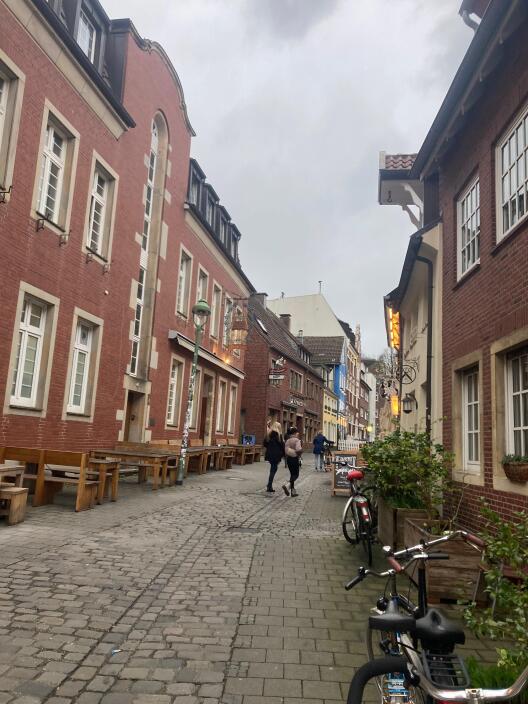
On the Bus
I was heading back from the Brazil Centre to the accommodation by bus. I didn’t have the courage to go by bike because it was so cold. At every bus stop, someone was pressing the button. There was almost no one on the bus. The bus moved a little and then someone pressed the button again. I thought, “What’s going on here?”
The driver stopped and started speaking to someone in German, and I thought it wasn’t directed at me. Then the guy stopped, looked at me in the rearview mirror, and I realised that I was the one leaning on the button!
Look, it was me! I had been pressing it non-stop. I didn’t realise it was me, and everyone started staring at me. I just wanted to run off the bus! I got off at the next stop and decided to wait for the next bus [laughs].
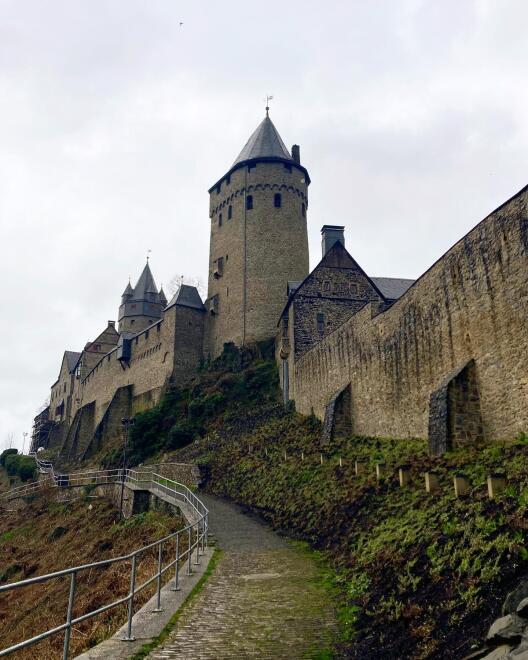
Visit to the Castle
I went to a castle, and this is a story I really treasure. It was the most beautiful one. It was very cold, and all the trains were delayed because of a strike. In the morning, I thought it would take me about three hours to get there. I kept checking the times and thought, "Maybe I won’t go." But then I decided, “I will go! If it doesn’t work out, it doesn’t work out!”
That day, there were hardly any people on the streets because of the rain and cold. So, I went to the station. When I got there, the town was tiny, and the castle was lovely. As soon as you get to the train station, you can see the castle and road you have to go up to the castle.
To sum it up: Once I was there, I walked from the station to a bus stop, to a terminal. Then I took a bus that would drop me right at the castle’s entrance. Wonderful! I thought, I’ll just sit on the bus. But I took the wrong bus! It was raining, and I was feeling lazy. So, I ended up going to the other side of the town. I soon realised that the bus wasn’t going where I wanted it to go!
And because I was too lazy to climb up the hill, I had to walk even more. I think I walked for about an hour to get to the castle, holding a coffee in my hand. I stood in the rain, drinking my coffee in the rain.
When I got there, it was totally worth it. What a beautiful place! There was nobody there, it was so quiet. An entire castle to myself, absolutely stunning. I thought, “All the trouble was worth it!”
I left with the trains still having problems, having taken the wrong bus, but in the end, I was really impressed. It was an experience that made me think, “I’m so glad I came!”
It’s beautiful, even though it’s not the biggest castle. But it sits on top of a little hill, so you can see the river and even have lunch there! I highly recommend it.
So, that was an experience that surprised me. I went alone, and usually, I don’t like going on trips by myself. But I realised that it’s actually quite nice – you can do it, and you have to make the most of it!
And that’s how I got to know more about the country, Germany. I was really impressed.
Thiago, thank you so much for sharing your experiences with us! It was really lovely to hear how openly and enthusiastically you shared your stories. We’re so happy to hear about all the impressions you gathered during your time at the University of Münster – both professionally and personally. We wish you all the best for your future and hope that the connection to Münster stays strong, and that our paths cross again in the future!

